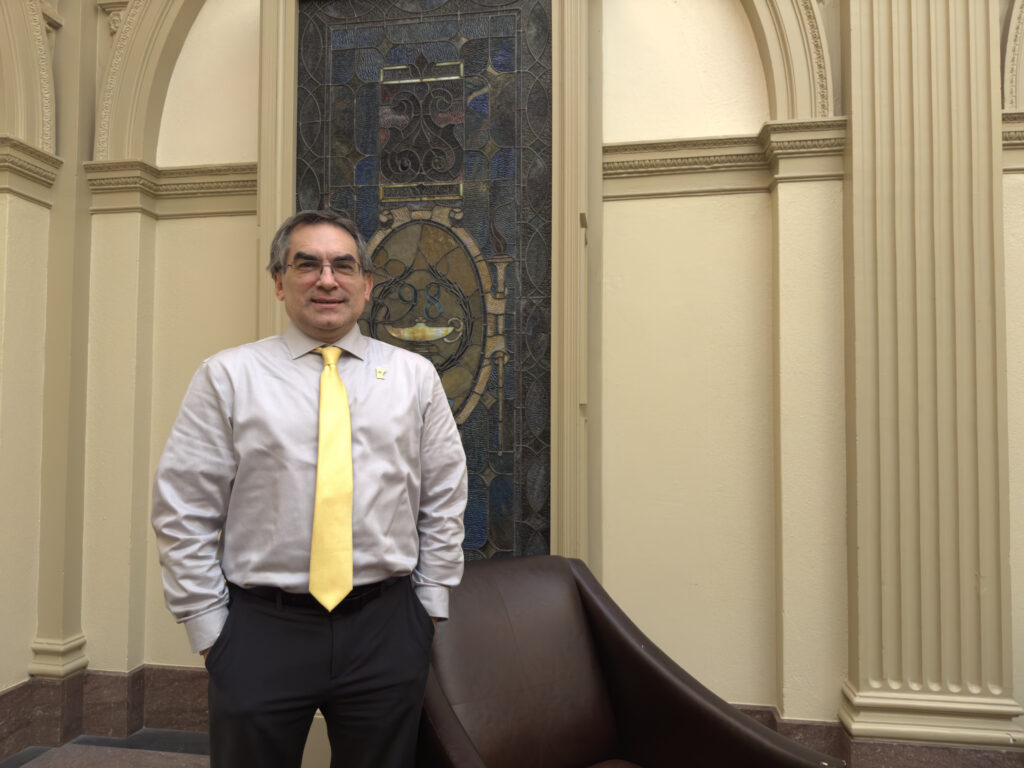Fifth-gen Minnesotan, first-gen dean
CEHD Dean Michael Rodriguez leads the university with a renewed perspective in educational research and college readiness

By Caleb Fravel
When Michael Rodriguez arrived at the University of Minnesota’s Morris campus in 1983, he faced the challenges typical of many first-generation students like himself. He wondered how his financial needs would be met, and he did not know how to pick a major or what would happen if he needed to change it.
Today, as dean of the College of Education and Human Development, Rodriguez says the issues and systems that frustrated him as an undergraduate persist for first-generation students. But now, he’s determined to change that.
Rodriguez oversees a college with one of the highest rates of first-generation students, who comprise about 35% of enrollment. To make CEHD more accessible, he is applying research in first-generation learning and modeling a bold new approach to college readiness — one that puts the burden on the institution, not the student.
“We (the university) need to be ready to support students to achieve their goals,” Rodriguez said.
Finding an educational community
Rodriguez initially wanted to transfer to the Twin Cities campus after his first year at Morris, but he stayed all four years after being drawn to the campus’ sense of community, which he believes is important for first-generation students like himself. He found a support system that guided him as he earned his undergraduate degree in psychology in 1989.
“I was the first in my family to go to college,” Rodriguez said. “And I felt like the Twin Cities campus was just this big giant place that I was intimidated by.”
Rodriguez eventually attended the Twin Cities campus for a post-undergraduate elementary education program before deciding the field was not for him. Instead, he earned a master’s degree in social policy from the University of Minnesota’s Hubert H. Humphrey School of Public Affairs in 1995.
Rodriguez said he discovered the field of educational measurement while working at the Wilder Research Center in St. Paul, a group that measures and improves program effectiveness. Many of the initiatives he was evaluating, such as after-school youth programs, were targeted toward underserved communities with persistent issues such as substance abuse.
His work revealed ways to improve organizations and education through data and information, which pushed him to return to school, he said.
“I just felt like I needed to be able to do better and do more,” Rodriguez said. “And I needed to learn more.”
Rodriguez completed his doctorate in measurement and quantitative methods at Michigan State University in 1999.
All of his education — including courses in youth development, creating equitable public policy and other fields — was coming together, he said.
When a faculty position opened up at the University of Minnesota in 1999, he filled it.
Becoming a teacher and a leader
Rodriguez started at the university as a tenure-track professor in the department of educational psychology. He continued to research educational measurement in CEHD, including educational equity. Over the years, he has taught courses in relevant subject areas, including survey design and educational measurement.
“He’s really just an amazing teacher, which is what makes him a great dean,” said Katie Pekel, the executive director of educational leadership for CEHD.
Pekel recalled a time when she was designing a statewide survey of principals. When she asked Rodriguez to look it over, he attempted to teach her about survey design.
“I said, ‘Michael, I don’t have time — nor do you — for you to teach me,’” Pekel said. “I just need you to tell me what to do. And he laughed a little, and he goes, ‘But then you won’t learn it in the same way.’”
Julie Sweitzer, who retired from her role as the director of the university’s College Readiness Consortium in 2021, said Rodriguez is passionate about and committed to equity in education.
Together, Rodriguez and Sweitzer founded the Educational Equity Resource Center in 2015, which aims to translate research into practice to eliminate predictable educational outcomes based on demographics.
Rodriguez was appointed as the Campbell Leadership Chair in CEHD shortly before founding the center. He said he leveraged the resources from an endowment given by the Campbell family to start the resource center.
Doing so was a critical early step to pull together CEHD’s resources and sharing them with educators, Sweitzer said. Rodriguez has since continued to take steps to advance that work.
Supporting first-gen in CEHD
When he became dean, Rodriguez shifted the dean’s section of the weekly CEHD newsletter into a section that highlights different faculty, staff or students. In the college’s first-year course, every CEHD student reads the same book to give every student a common experience, Rodriguez said.
He sees the success of these initiatives in numbers.
About 40% of first-year students identify as first-generation students, Rodriguez said. Nearly 45% of enrolled students were from underrepresented groups, including Indigenous, Black, Latino and Asian students. CEHD’s four-year graduation rate is at its highest point in the past four years, he added.
“We want to be seen as accessible but also to be able to support you to be successful,” Rodriguez said.
Such tactics are a way of moving the whole institution toward a new definition of college readiness with small, local changes that the campus should be paying attention to more broadly
Rodriguez said there is no one definition of college readiness. Students come to college for many reasons: sports, art, science, liberal arts and more. From a first-gen perspective it is the institution’s job to be ready for students, Rodriguez said.
“Our whole deal is getting this institution prepared for those students,” he added.
As the number of first-generation students on campus continues to expand, a lot of people within CEHD are interested in the first-generation student experience, Rodriguez said.
The First Gen Institute, founded by Rashné Jehangir, is focused on supporting faculty and staff through training and learning opportunities so they have the knowledge and skills to support first-generation students, Rodriguez said. A soon-to-be-open center in Appleby Hall will also provide direct support to students.
When Rodriguez appointed Jehangir as CEHD’s assistant dean of educational opportunity programs, she felt it was an extension of Rodriguez centering the institute’s work in the mission of the college, Jehangir said.
“I continue to be really impressed with how Michael, who’s a distinguished scholar, really leads with his values,” she said.
Rodriguez said he has also tried to prepare the institution by fostering transparency and community.
First-generation students did not grow up hearing about their parents’ college experience, so they often do not even know what questions to ask, Rodriguez said. CEHD tries to foster this transparency by having advisers provide written advice and statements that inform students of their expectations and responsibilities.
“We can’t sit and wait for students to come and ask us questions,” he said. “We have got to reach out with clear, understandable information.”
Though he misses teaching, Rodriguez said he is teaching in a different way and to a bigger audience, including alumni, donors, colleagues and others across the University of Minnesota system.
“I’m not going anywhere,” Rodriguez said. “I will retire here, so I am happy to serve the institution as needed.”


One response to “Fifth-gen Minnesotan, first-gen dean”
Wonderful example of a success story! Twenty-five years ago, twelve first generation U of M students started a Latino-based multicultural fraternity at the U of M’s Minneapolis campus. The fraternity, Sigma Lambda Beta, is still active on campus with over 125 alumni. These individuals have gone on to do great things in a variety of industries and are a testament to the many supportive programming at the University. The fraternity is celebrating their 25-year anniversary this weekend.